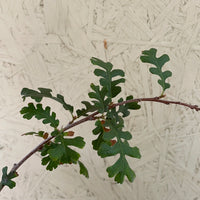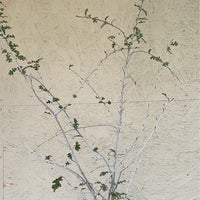

Quercus lobata, Valley Oak
Quercus lobata, Valley Oak
A California Native that is the largest North American Oak, reaching up to 100 feet tall. It can reach up to 60 feet in 20 years. The leaves will turn from green to yellow to brown in the fall. Then it goes deciduous in the winter. Acorns drop in fall, Acorn Woodpeckers, Western Scrub Jay, and the California squirrel consume the acorns. The matte green leaves are fuzzy and pale green on underneath. Valley oaks can tolerate wild fires.
This tree should be pruned in the winter when it is dormant. You should head back and remove all but one leader if young trees have multiple leaders. Fallen leaves can be used for mulch.
| Family Name | Fagaceae |
| Species Name | Quercus lobata |
| Common Name | Valley Oak |
| Native to | California |
| Plant Type | Tree |
| Height x Width | 60-100' x 50' |
| Growth Habit | Rounded, upright columnar |
| Growth Rate | Moderate, sometimes fast |
| Sun Exposure | Full sun |
| Water Requirement | Low, moderate |
| Soil Type | Prefers deep, well drained loam, able to adapt to other soils and create this overtime with its leaf litter |
| Flower Color | Inconspicuous flowers, small and yellow-green |
| Flowering Months | Winter, spring |
| Evergreen/Deciduous | Winter deciduous |
| Fragrant | No |
| Cold Hardy to | 15°F |
| Attracts pollinators | Butterflies |
| Container Plant | No |
| Erosion Control | Yes |
| Bank Stabilization | Yes |
| Fire Resistant | Moderate |
| Deer resistant | Yes |
| Local plant | Yes |
This content type will accept rich text to help with adding styles and links to additional pages or content. Use this to add supplementary information to help your buyers.
You can use product metafields to assign content to this tab that is unique to an individual product. Use tabs to highlight unique features, sizing information, or other sales information.
Quercus lobata, Valley Oak
A California Native that is the largest North American Oak, reaching up to 100 feet tall. It can reach up to 60 feet in 20 years. The leaves will turn from green to yellow to brown in the fall. Then it goes deciduous in the winter. Acorns drop in fall, Acorn Woodpeckers, Western Scrub Jay, and the California squirrel consume the acorns. The matte green leaves are fuzzy and pale green on underneath. Valley oaks can tolerate wild fires.
This tree should be pruned in the winter when it is dormant. You should head back and remove all but one leader if young trees have multiple leaders. Fallen leaves can be used for mulch.
| Family Name | Fagaceae |
| Species Name | Quercus lobata |
| Common Name | Valley Oak |
| Native to | California |
| Plant Type | Tree |
| Height x Width | 60-100' x 50' |
| Growth Habit | Rounded, upright columnar |
| Growth Rate | Moderate, sometimes fast |
| Sun Exposure | Full sun |
| Water Requirement | Low, moderate |
| Soil Type | Prefers deep, well drained loam, able to adapt to other soils and create this overtime with its leaf litter |
| Flower Color | Inconspicuous flowers, small and yellow-green |
| Flowering Months | Winter, spring |
| Evergreen/Deciduous | Winter deciduous |
| Fragrant | No |
| Cold Hardy to | 15°F |
| Attracts pollinators | Butterflies |
| Container Plant | No |
| Erosion Control | Yes |
| Bank Stabilization | Yes |
| Fire Resistant | Moderate |
| Deer resistant | Yes |
| Local plant | Yes |


